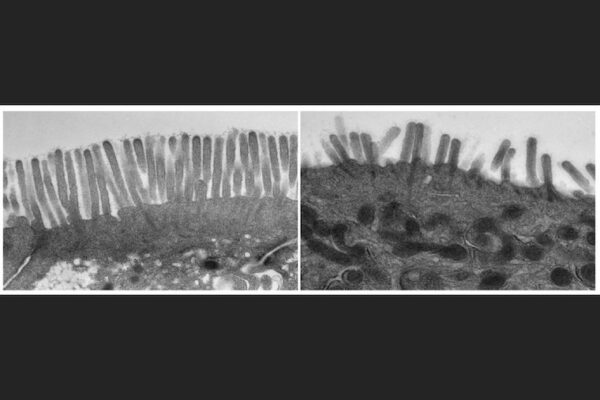‘Motivated by hope and humility’
Jeffrey I. Gordon, MD, explores the “vast, mysterious world” of the microbiome to find solutions to promote healthy growth in malnourished children. In recognition of his groundbreaking work, Gordon received the 2022 Dr. Paul Janssen Award for Biomedical Research.
WashU research spurs changes to global guidelines for feeding malnourished kids
Results of a major clinical trial in Africa led by Mark Manary, MD, at Washington University School of Medicine, have prompted a change in global guidelines for therapeutic food.
Luke contributes to new report on U.S. dietary guidelines
Douglas Luke, the Irving Louis Horowitz Professor in Social Policy at the Brown School, was part of a National Academies of Science committee that reviewed how federal dietary guidelines are developed.
Some forms of childhood malnutrition, stunting may be preventable with vaccines
Researchers at the School of Medicine have discovered that vaccinating mice against a bacterial toxin produced by E. coli can prevent intestinal damage. The finding suggests new ways to prevent malnutrition and stunting in children.
Researchers bring Body U to schools with HHS grant
The U.S. Department of Health and Human Services has awarded researchers Ellen Fitzsimmons-Craft and Denise Wilfley a grant to help improve outcomes for eating disorders in adolescent girls.
Gordon honored by National Academy of Medicine
Washington University School of Medicine’s Jeffrey Gordon, MD, has received the inaugural David and Beatrix Hamburg Award for Advances in Biomedical Research and Clinical Medicine from the National Academy of Medicine. Gordon is regarded as the father of the field of microbiome research.
Don’t fret the ‘freshman 15’; make friends with food
Make peace with food. Honor your hunger. Reject a diet mentality. These are the important lessons that Rebecca Miller, assistant director for nutrition and dietary wellness at Washington University Dining Services, shares with new students.
Cigarette smokers who try to quit often end up vaping and smoking
Researchers at Washington University School of Medicine have found that as people who smoke cigarettes attempt to quit, some move to e-cigarettes, but such people often become dual nicotine users, smoking and vaping. Researchers found that smoking-cessation treatments can help such users quit.
Gut bacteria mine dietary fiber to release beneficial nutrients
A new study from Washington University School of Medicine found that the fiber byproducts of food production may be an untapped source of beneficial biomolecules that contribute to human health.
Gut bacterium supports growth in infants with severe acute malnutrition
A new study led by Washington University School of Medicine and the International Centre for Diarrhoeal Disease Research in Dhaka, Bangladesh, shows that a standard milk-based therapy plus treatment with a specific strain of gut bacteria reduces gut inflammation and promotes weight gain in infants with severe acute malnutrition.
Older Stories









